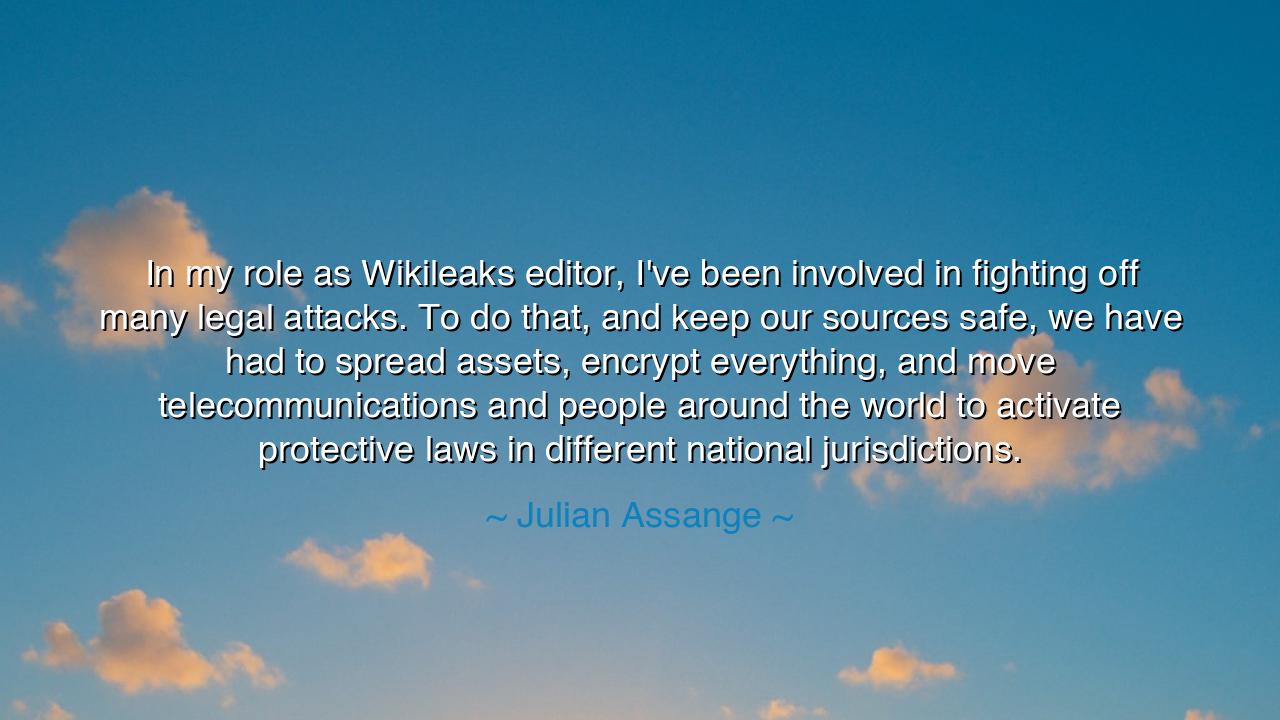
In my role as Wikileaks editor, I've been involved in fighting
In my role as Wikileaks editor, I've been involved in fighting off many legal attacks. To do that, and keep our sources safe, we have had to spread assets, encrypt everything, and move telecommunications and people around the world to activate protective laws in different national jurisdictions.






When Julian Assange declared, “In my role as WikiLeaks editor, I’ve been involved in fighting off many legal attacks. To do that, and keep our sources safe, we have had to spread assets, encrypt everything, and move telecommunications and people around the world to activate protective laws in different national jurisdictions,” he spoke not as a mere publisher of secrets, but as a warrior of information, a figure caught between the shadows of power and the light of truth. His words are not the calm reflections of an administrator; they are the battle cry of one engaged in a modern war — not fought with swords or armies, but with data, law, and ideology.
The origin of this quote lies in the turbulent years following the founding of WikiLeaks, an organization that sought to expose government and corporate secrets to the world. Assange’s mission was to make the powerful transparent — to reveal what was hidden from the people in whose name power was exercised. Yet, in doing so, he became the target of that very power. Governments sought to silence him, corporations denounced him, and the machinery of the state moved to crush him. The “legal attacks” he speaks of were not simply lawsuits; they were acts of war in the digital age — attempts to control truth through law, and to cage the voice of disclosure through fear.
His response — to “spread assets, encrypt everything, and move people around the world” — speaks to the adaptability of those who live by conviction rather than convenience. In the ancient world, sages and prophets who challenged kings were forced into exile, carrying their wisdom from city to city to preserve their message. Socrates was condemned by his own city for questioning its hypocrisies; Confucius wandered among hostile courts seeking a ruler wise enough to hear him. So too did Assange and his allies scatter their networks across nations, using technology as their refuge, and law as both shield and sword. In his words, one hears the echo of those who have always faced persecution for speaking the inconvenient truth.
To “activate protective laws in different jurisdictions” is not merely a logistical maneuver — it is an act of philosophical cunning. It recognizes that law itself is not universal, that justice in one land may be oppression in another. Assange’s strategy was to turn the complexity of the modern world — its overlapping sovereignties, its conflicting codes — into a fortress for truth. Like a chess master, he moved not only people but principles, navigating the invisible frontiers of legality and morality. In doing so, he laid bare the paradox of civilization: that even in an age of liberty, truth must still flee from power.
Yet, there is tragedy beneath his defiance. For the man who sought to make the world transparent became himself a fugitive, his life reduced to shadows, his freedom sacrificed to the ideals he pursued. His encryption, his movements, his defenses — all were acts of survival, but also acts of isolation. It is the fate of every revolutionary who challenges the established order: to become both hero and exile, revered and reviled. In this, Assange joins a lineage of figures from Prometheus, who stole fire from the gods, to Galileo, who defied the Church to defend the truth of the stars. All bore the same burden — that those who illuminate darkness often suffer beneath its weight.
The deeper wisdom of Assange’s words lies not in his technical or political maneuvers, but in the spiritual lesson they carry. He reminds us that truth is never safe, that to defend it demands vigilance, courage, and often sacrifice. In an age when information flows freely, it is easy to forget how fragile honesty can be. Power will always seek to conceal itself; it is the nature of empires to build walls around their secrets. Thus, those who stand for transparency must learn, as Assange did, to protect the light with armor — to be both visionary and tactician, idealist and survivor.
Let this be the teaching passed down: truth must be defended with both wisdom and courage. The path of the truth-bearer is not one of comfort, but of conflict. To live for transparency is to walk the razor’s edge between revelation and ruin. And yet, if no one dares to walk it, the world will drown in deception. Julian Assange’s words remind us that the fight for truth is eternal — that in every age, those who guard the flame must carry it through darkness, shielding it from the winds of power, until dawn returns once more.






AAdministratorAdministrator
Welcome, honored guests. Please leave a comment, we will respond soon